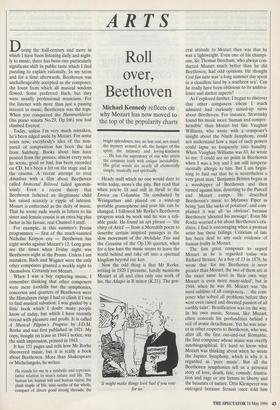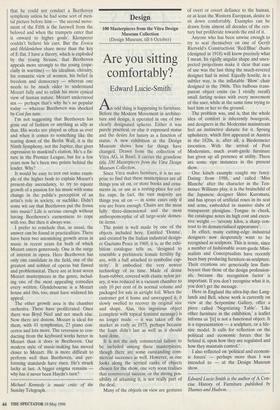ARTS
Roll over, Beethoven
Michael Kennedy reflects on why Mozart has now moved to the top of the popularity charts During the half-century and more in which I have been listening daily and night- ly to music, there has been one particularly significant shift in public taste which I find puzzling to explain rationally. In my teens and for a time afterwards, Beethoven was unchallengeably accepted as the composer, the fount from which all musical wisdom flowed. Some preferred Bach, but they were usually professional musicians. For the listener with more than just a passing interest in music, Beethoven was the tops. When you conquered the Hammerklavier (his piano sonata No.29, Op.106) you had climbed Everest.
Today, unless I'm very much mistaken, he's been edged aside by Mozart. For some years now, everybody's idea of the non- pareil of composition has been the lad from Salzburg. Books about him have poured from the presses, almost every note he wrote, good or bad, has been recorded on CD, he's been a hit on the stage and in the cinema. A recent attempt to rival Amadeus with a film about Beethoven called Immortal Beloved failed ignomin- iously. Even a recent theory that Beethoven fathered an illegitimate child has raised scarcely a • ripple of interest. Mozart is enthroned as the deity of music. That he wrote rude words in letters to his sister and female cousin is an extra big plus factor in his favour, real Channel 4 stuff.
For example, in this summer's Proms programmes — first of the much-vaunted Nicholas Kenyon era — Beethoven has eight works against Mozart's 12. Long gone are the times when Friday night was Beethoven night at the Proms. Unless I am mistaken, Bach and Wagner were the only other composers granted a weekly night to themselves. Certainly not Mozart.
When I was a boy exploring music, I remember thinking that other composers were mere foothills but the symphonies, concertos and quartets of Beethoven were the Himalayan range I had to climb if I was to find musical salvation. I was guided by a little book which I doubt many people know of today, but which I have recently reread with pleasure and profit. It is called A Musical Pilgrim's Progress by J.D.M. Rorke and was first published in 1921. My copy, bought on leave in 1944 I notice, was the sixth impression, printed in 1943. It has 151 pages and tells how Mr Rorke discovered music, but it is really a book about Beethoven. More than Shakespeare or Michelangelo, he writes:
He stands for me in a symbolic and represen- tative relation to man's nature and life. The human lot; human will and human vision; the plain staple of life, nine-tenths of the whole, compact of divers good strong threads; the bright splendours, too, no less real, not tinsel; the mystery around it all; the hunger of the spirit; the intimacy and loving-kindness ... He has the supremacy of one who utters the common truth with unique inevitability. His gfeat words are nearly all elementally simple, musically and spiritually.
Heady stuff which no one would dare to write today, more's the pity. But read that when you're 18 and still in thrall to the Eroica on Columbia 78s conducted by Weingartner and played on a wind-up portable gramophone and your life can be changed. I followed Mr Rorke's Beethoven progress work by work and he was a reli- able guide. He found an apt phrase — 'the chirp of Ariel' — from a Meredith poem to describe certain inspired passages in the slow movement of the Archduke Trio and the Cavatina of the Op.130 quartet, when for a few bars the music seems to leave the world behind and take off into a spiritual kingdom beyond our ken.
Now the odd thing is that Mr Rorke, writing in 1920 I presume, hardly mentions Mozart at all and cites " only one work of his, the Adagio in B minor (K.21). Tne gen- `It might make things look bad if you vote for us.' eral attitude to Mozart then was that he was a lightweight. Even one of his champi- ons, Sir Thomas Beecham, who always con- ducted Mozart much better than he did Beethoven, had odd opinions. He thought Cosi fan tune was 'a long summer day spent in a cloudless land by a southern sea'. Can he really have been oblivious to its ambiva- lence and darker aspects?
As I explored further, I began to discover that other composers whom I. much admired had curiously mixed-up views about Beethoven. For instance, Stravinsky found his music more 'human and compre- hensible' than Mozart but like Vaughan Williams, who wrote with a composer's insight about the Ninth Symphony, could not understand how a man of such powers could lapse so frequently into banality. When Vaughan Williams was 83, he wrote to me: 'I could see no point in Beethoven when I was a boy and I am still tempera- mentally allergic to him. But I am begin- ning to find out that he is nevertheless a very great man.' Benjamin Britten began as a worshipper of Beethoven and then turned against him, deserting to the Purcell and Mozart camps. He described Beethoven's music to Myfanwy Piper as being 'just like sacks of potatoes', and com- plained it was all 'so obvious' because Beethoven 'shouted his message'. Even Mr Rorke worried a bit about Beethoven's cm- dities. I find it encouraging when a protean artist has these failings. Criticism of late has been deaf to any such evidence of human frailty in Mozart.
The first great composer to regard Mozart as he is regarded today was Richard Strauss. As a boy of 13 in 1878, he wrote that 'for me Beethoven is never greater than Mozart, the two of them are at the exact same level in their own way; Mozart is even more many-sided', but in 1944, when he was 80, Mozart was 'the most sublime of all composers .. . the com- poser who solved all problems before they were even raised and divested passion of all earthly taint'. Beatification was on the way. In his own music, Strauss, like Mozart, often conceals his profundities behind a veil of ironic detachment. Yet he was near- er in other respects to Beethoven, who was, after all, the first out-and-out Romantic, the first composer whose music was overtly autobiographical. It's hard to know what Mozart was thinking about when he wrote the Jupiter Symphony, which is why it is regarded as 'pure music'. But all the Beethoven symphonies tell us a personal story of love, death, fate, comedy, frustra- tion and rage or are hymns to liberty and the beauties of nature. Otto Klemperer was outraged because Strauss once told him that he could not conduct a Beethoven symphony unless he had some sort of men- tal picture before him — 'the second move- ment of the Fifth is the farewell from the beloved and when the trumpets enter that is onward to higher goals'. IClemperer couldn't believe his ears. But the Eroica and Heldenleben share more than the key of E flat. I have a theory, which is exploded by the young Strauss, that Beethoven appeals more strongly to the young (espe- cially in wartime) — his idealism, chivalry, his romantic view of women, his belief in freedom and democracy — whereas one needs to be much older to understand Mozart fully and to relish his more cynical view of human nature. Mozart understood sex — perhaps that's why he's so popular today — whereas Beethoven was shocked by Cosi fan tutte.
I'm not suggesting that Beethoven has gone out of fashion or anything as silly as that. His works are played as often as ever and when it comes to something like the tearing down of the Berlin Wall, it is the Ninth Symphony, not the Jupiter, that gives expression to mankind's elation. He's a fix- ture in the Premier League, but for a few years now he's been two points behind the leader. Why?
It would be easy to trot out some exam- ple of the higher bosh to explain Mozart's present-day ascendancy, to try to equate growth of a passion for his music with some change in the public's perception of an artist's role in society, or suchlike. Didn't some wit say that Beethoven put the frown into music? Life is serious enough without having Beethoven's earnestness to cope with too. But then it always was.
I prefer to conclude that, as usual, the answer can be found in practicalities. There have been two astonishing growth areas in music in recent years for both of which Mozart caters generously. One is the surge of interest in opera. Here Beethoven has only one candidate in the field, one of the greatest and noblest of operas but flawed and problematical. There are at least seven Mozart masterpieces in the genre, includ- ing one of the most appealing comedies every written. Glyndebourne is a Mozart house and this, too, must have widened his appeal.
The other growth area is the chamber orchestra. These have proliferated. Once there was Boyd Neel and not much else. Now there are dozens. Mozart is ideal for them, with 41 symphonies, 27 piano con- certos and lots more. The reversion to con- ducting from the keyboard works better in Mozart than it does in Beethoven. Our modern style of music-making has moved closer to Mozart. He is more difficult to perform well than Beethoven, and per- forming standards have risen. He's struck lucky at last. A bigger enigma remains why has it never been Haydn's turn?
Michael Kennedy is music critic of the Sunday Telegraph.



































































 Previous page
Previous page